THE WINDHAM CASE.
WITH Englishmen, an argument addressed to the purse seldom fails ; and the announcement of Mr. Wind- ham's counsel, that the establishment of his client's sanity will add some 20,0001. to the encumbrances on his estate, will probably nerve the public indignation to outlive even the intolerable tedium of this protracted inquiry. Men of common sense are already asking each other whether the question at issue might not have been decided at least at a, more moderate cost, and whether this is not a somewhat ex- orbitant fine even for folly, eccentricity, and vice. Besides, it is alarming to learn that relatives, who have been—it may be jusVy—offended by extravagance of life or manner, can not only lay bare before the world all the faults and foibles of a,han's whole career, but by thus invoking the aid of the Coitrt of Chancery, can compel him to expose his vices and consummate his ruin at his own expense. There is, moreover, from first to last, nothing in the case on which the mind of any reasonable on-looker can dwell with satisfaction. The picture is absolutely without relief. It is doubtful whether this unhappy lad has been more in- jured by the kindness of his relatives, or their neglect. A. boy of dull intellect and boisterous animal spirits, spoiled by the foolish indulgence of his parents, could only be re- strained, if restrained at all, by immovable temper and self- restraint. But these seem to havebeenpreciselythe qualities of which the gentlemen selected for his tutors were most in want. We have heard their tale from their own lips, and no doubt th ey had provocation. But you cannot soften a pupil's manners by knocking him down. That Mr. Windham's uncles should support the tutors against what they regarded as his insub- ordination, and that his mother, who appears to have been severed from her family by her own marriage, should take his part, seem to be the only other conditions requisite to account for that astounding career of recklessness, ineptitude, and shamelessness, with which, for now some thirty days, the public has been nauseated. There is no need to dwell on the filthy and often incredible details of the evidence. It discloses a sort of Walpurgis night, in which this miserable representative of an ancient house is to be seen surrounded by a gibbering circle of degrading associates—low lodging- house keepers, sharp money-lenders, railway-guards, police- men, prostitutes, and attorneys, all eager for booty—while the pigeon, not very clear-headed at the best of time; muddled yet more by the discrepancy between his compara- tively narrow present income and his really splendid future prospects, yields himself an easy prey, until, finally, his relations, irritated by his follies, their family pride revolted by the shameless imprudence of his marriage, attribute, in their indignation, to mental disease the consequences of an evil training for which it is impossible to hold them wholly irresponsible. But it is not so much to the incidents of a strife which is still sub judice that public attention should be directed as to the nature of the procedure by which questions of this kind are decided. In poor Mr. Windham's case, the com- mission has been issued, the witnesses summoned, and the lawyers feed. But we do trust that this is the last time that common sense will be shocked by so extra- vagant an expenditure of time and money. In the first place, the whole form of the proceedings is unnecessarily costly. What valid reason can be given—the historical causes of it are sufficiently on the surface—why the sanity of a living man should not be determined in the same way as that of a deceased testator ? If, instead of an inquiry be- fore a Master in Lunacy and twenty-three jurymen, the law allowed an issue similar to that of devisavit vol non to be tried on circuit by a common law judge and twelve jurymen, it is probable that half the expense would be saved. The jury would receive one guinea each for the whole trial in- stead of two guineas each for every day it lasts. The ex- penses of the witnesses would be less, and the fees of counsel would be infinitely less. But great as would be the saving in money, it would be still greater in time. It is not easy for a Master in Lunacy toNcontrol counsel of far greater emi- nence at the bar than he himself will ever attain. Irrelevant evidence, repetition, and useless cross-examinations would not be tolerated by one of the superior judges. And it is not too much to say that before such a tribunal the cause could not have been spun out to half its intolerable length. But the climax of absurdity has been reached in the deci- sion of the Master that the examination of Mr. Windham shall be conducted in private. The Legislature has expressly refused to give this power of secret examination even to the Judge of the Court of Divorce, where matters are daily in- vestigated compared with which the most prurient details of the Windham case are almost decent. The minds of the jury should, indeed, be scrupulously preserved from bias ; but they ought not to be abandoned to caprice. Their functions must be exercised in the light of day, and as soon as the verdict is delivered, it is the duty of the public press to see that it is the fair result of' the evidence on which it professes to be grounded. But how can a verdict be even discussed which will be based not so much on the evidence of the witnesses whom the public has heard as on that of the alleged lunatic whom it has not. This secrecy is not only opposed to the feelings and habits of the community, it is earnestly deprecated by Mr. Windham himself. If, indeed, it were a concession made to Us ner- vousness, to his anxiety as to the result of a trial which may deprive him of liberty and reduce him for ever to the level of a child, while we deplored we might acquiesce in the de- cision. But it does seem hard that an accused, who claims the advantages of an open trial, and courts publicity—the right conceded to the meanest criminal—should be denied, not for his own, but for his judge's sake. "If the public were present," it is Mr. Warren who would "be dumb." The first idea of any one who has fresh in his mind some of the stories in the Diary of a Late Physician will be, What very nasty questions Mr. Warren must be going to ask ! But from the infantine naiveté of his remarks whenever a witness has alluded to anything naughty, we imagine that ever since the publication of the work in question he has gradually been growing to his present happy state of childlike inno- cence. It is a lovely thing to see a middle-aged lawyer of this ethereal purity of mind. It is not a common result of practice at the bar' and great sacrifices should be made to preserve so. rare and so precious an exotic. But justice also is something worth. The liberty of the subject is a thing Englisinfien have been accustomed to value. The feelings are touched by the agony of a man pleading for all the dearest rights of manhood, and even Mr. Warren's modesty may be bought too dear. It would not, however, be fair to attribute even the priu- ,cipal blame to any defects in the tribunal. Litigation is, After all, a kind of war, and the bulk of the legal armies will be proportioned to the magnitude of the stake. But it would be only just, so long as the interests of the alleged lunatic and his relatives are regarded as essentially diffe- rent, that the victor should enjoy the spoils of war. At present, the Lords Justices act as a sort of grand jury, deciding on affidavits submitted to them, whether there is a primirfacie case for the issuing of the commission. And it is obviously hopeless to ask for costs from the discretion of judges who have already decided that there is a case for inquiry. We would alter this practice, and make the costs in all cases follow the event. The good old rule of the Eng- lish law, that the loser pays, is, we are convinced, a whole- some one. And the change would be in entire harmony with the traditions of the law and the feelings of the public. ) A petitioner would be compelled, by the danger of being . saddled with costs in case of failure, to prune with a vigorous thhTinaatlulralexpinedickturoentuhnatnecceoulssad unnecessary litigation.laitviogaidtedie.n. TNhisetwtohulatd we hand all insinuate even that in these cases the relatives are commonly actuated by sordid or vindictive motives. But there must be a feeling that the wretched scapegrace has stained the name of which they are justly proud—that he is attering what he did net gather, and squandering the pro- erty by which his ancestors hoped to perpetuate the dignity f their house—feelings just and natural in themselves, but hich lead them to view all his actions with a jaundiced eye, . d into which the frailty of human nature, uncontrolled by any tangible penalty, will be unconsciously but inevitably drawn.
Unhappily for Mr. Windham himself, this inquiry must terminate either in his being restored to full liberty of action, or placed under a life-long restraint. We have recently pointed out the advantages that would ensue from the re- cognition of incapacity, as a medium state of mind, distin- guished from insanity. A person found incapable might be allowed a qualified liberty and the control of his income, but be restrained from dissipating his capital to the ruin of hiss family and himself. To hope for the immediate introduction of such a principle is, perhaps, premature, though all parties would be gainers by it, and none more so than the prodigal himself. But, meantime, we cannot believe that the ensuing session will be allowed to pass away without some remedy, or at least mitigation, being devised for so crying an evil. If so, a great public scandal will have elicited a great public good, and the lawyers will not, as now, be the only gainers by the Windham case.































 Previous page
Previous page